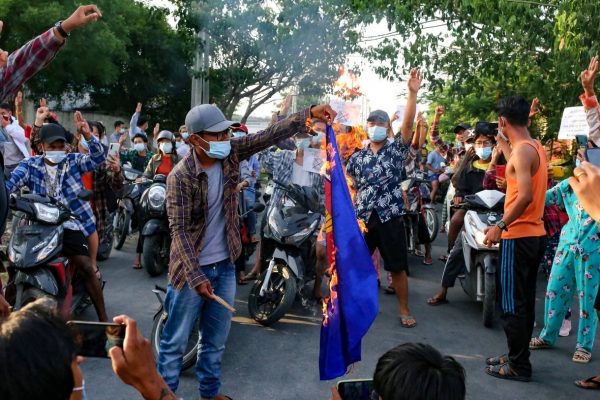It is about time for the West to ‘walk the talk’ on both its defence of democracy and its Indo-Pacific pivot. It’s about time to effect principled, immediate and tangible expression, both behind the Quad’s mantra as that of democracy in the region and the new Transatlantic huddle.
The ASEAN emergency summit had three unstated objectives. The first was symbolic — demonstrating ASEAN’s vaunted centrality in regional issues — and did not necessarily require an outcome. The second, related objective was to convince the international community — especially the United States, the European Union and Australia — that they can delegate a somewhat hypothetical resolution of the conflict to ASEAN.
Its third unstated objective was to reassure Southeast Asia’s authoritarian and semi-authoritarian leaders. The summit showed that the sacrosanct principle of non-interference will always hinder the application of the ASEAN Charter’s seventh purpose — strengthening democracy and protecting fundamental freedoms.
The last thing Thai Prime Minister Prayut Chan-o-cha wishes to do is encourage the Milk Tea Alliance against his own regime. The Vietnamese politburo would be equally appalled if its citizens realised they could have demands for democracy succeed.
The summit’s communique failed to adopt the Indonesian and Malaysian view that political prisoners including Aung San Suu Kyi and other duly elected parliamentarians should be released. And a month after the summit, the proposed ASEAN special envoy has still not been appointed.
Perhaps a fourth objective was simply to buy time. This has certainly been achieved for the military junta’s General Min Aung Hlaing, who faces no current concrete measures against him. By inviting him to Jakarta and not inviting a representative of the democratic opposition, ASEAN certainly gave him a degree of political recognition. On his return to Naypyidaw, he largely dismissed the advice he had received in Jakarta and scaled up repression.
Developments since have confirmed ASEAN’s fecklessness. The visit of Brunei’s Deputy Foreign Minister with the ASEAN Secretary General to Myanmar on 4 June was denounced by the Jakarta Post as a disaster, giving yet further legitimacy to the junta. In Mandalay, an ASEAN flag was burned by protestors. A couple of days later the Chinese Foreign Minister then urged ASEAN counterparts not to push too hard against the junta. On 14 June another trial on bogus corruption charges against Aung San Suu Kyi began to make her ineligible to run for office again.
ASEAN, as an inter-governmental entity designed to strengthen executive power, is devoid of both the carrots and sticks to bring about change in Myanmar. There is no provision under the Charter for a member to be expelled let alone punished.
Given the multiple fronts in the junta’s repression of the opposition — and ASEAN’s incapacity and unwillingness to meaningfully attempt to resolve the crisis — the international community must accept responsibility to act.
The card to play is recognition of the newly-established NUG as the legitimate government of Myanmar. Recognition could also open the door to international intervention at the NUG’s request on the basis of ‘responsibility to protect’ principles.
It is not a silver bullet. There are legitimate questions about its representative nature, notably the limited involvement of the Shan and the secondary role of other ethnic leaders, as well as the need to address the Rohingya genocide. But recognition of the NUG is the first step to disavow a return to the pre-democracy status quo. It could also open a window of opportunity to establish a federal system that has eluded Myanmar for over 70 years. It potentially provides a way forward to allow the repatriation of the 700,000 refugees Rohingya refugees and an acknowledgement of their Myanmar citizenship. This is a major international concern.
Such recognition is also a matter of self-interest. The situation provides a unique opportunity for the United States to retake the mantle of moral leadership in the promotion of democracy, and give tangible substance to its vision of the Indo-Pacific. Concrete, renewed support for Myanmar’s democratic transition also provides an opportunity to give substance to the expression of shared values across the Atlantic with the European Union and the United Kingdom, as well as with the three other members of the Quad.
Seeking Beijing’s agreement on recognition also provides an opportunity for meaningful cooperation with China. The energy security that China seeks through its pipelines in Myanmar is only sustainable in a political environment accepted by the people of Myanmar. A democratically elected government in Naypyidaw is in Beijing’s interests, rather than a Faustian bargain with a Sinophobic and incompetent Myanmar military. A legalistic recognition of the NUG could provide a way out of Chinese President Xi Jinping’s conundrum of not wanting to promote democracy.
Countering Russian President Vladimir Putin’s cynical support of the Tatmadaw is also a way of defying Russia’s authoritarian influence generally.
For ASEAN members, recognition of the NUG by Western countries would provide the opportunity for at least some of its more democratically inclined members to follow suit. This would allow the more authoritarian member countries to continue to liaise with the junta. While ASEAN itself may be unable to resolve the crisis under these conditions, individual ASEAN members might still realistically contribute to resolving it through coordinated engagement.
Alex Aung Khant is a youth and political activist from Yangon, a member of the National League for Democracy, grand-nephew of Aung San Suu Kyi, and an alumni of Sciences Po.
David Camroux is an Honorary Senior Research Fellow at the Center for International Studies (CERI), Sciences Po, Paris.


Two fault lines appear in a proposed but desirable NUG recognition by Western countries: The split within ASEAN in voting at the UN General Assembly on a an embargo on arms deliveries to Myanmar: four ASEAN abstentions included: Brunei (current chair) Cambodia, Laos and Thailand. The second fault line is the welcoming of Min Aung Hlaing to Moscow in what is interpreted as an embrace of solidarity.